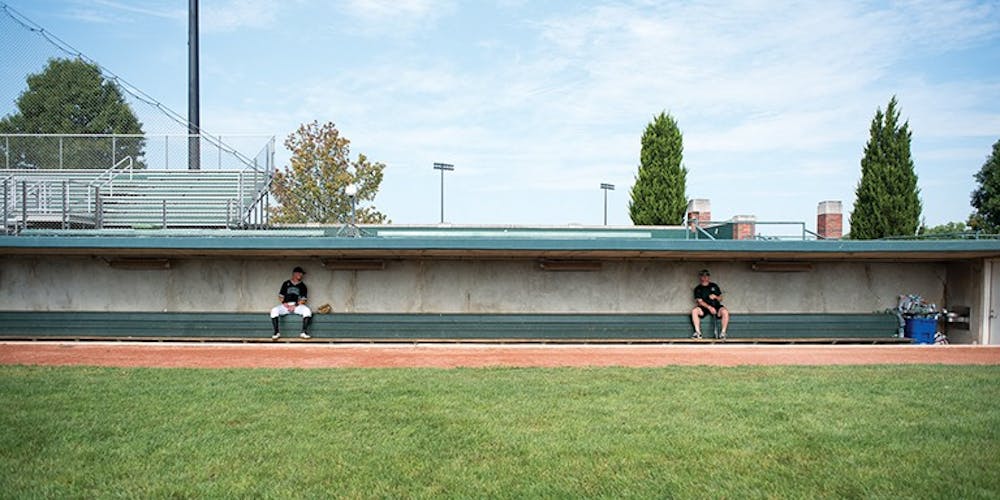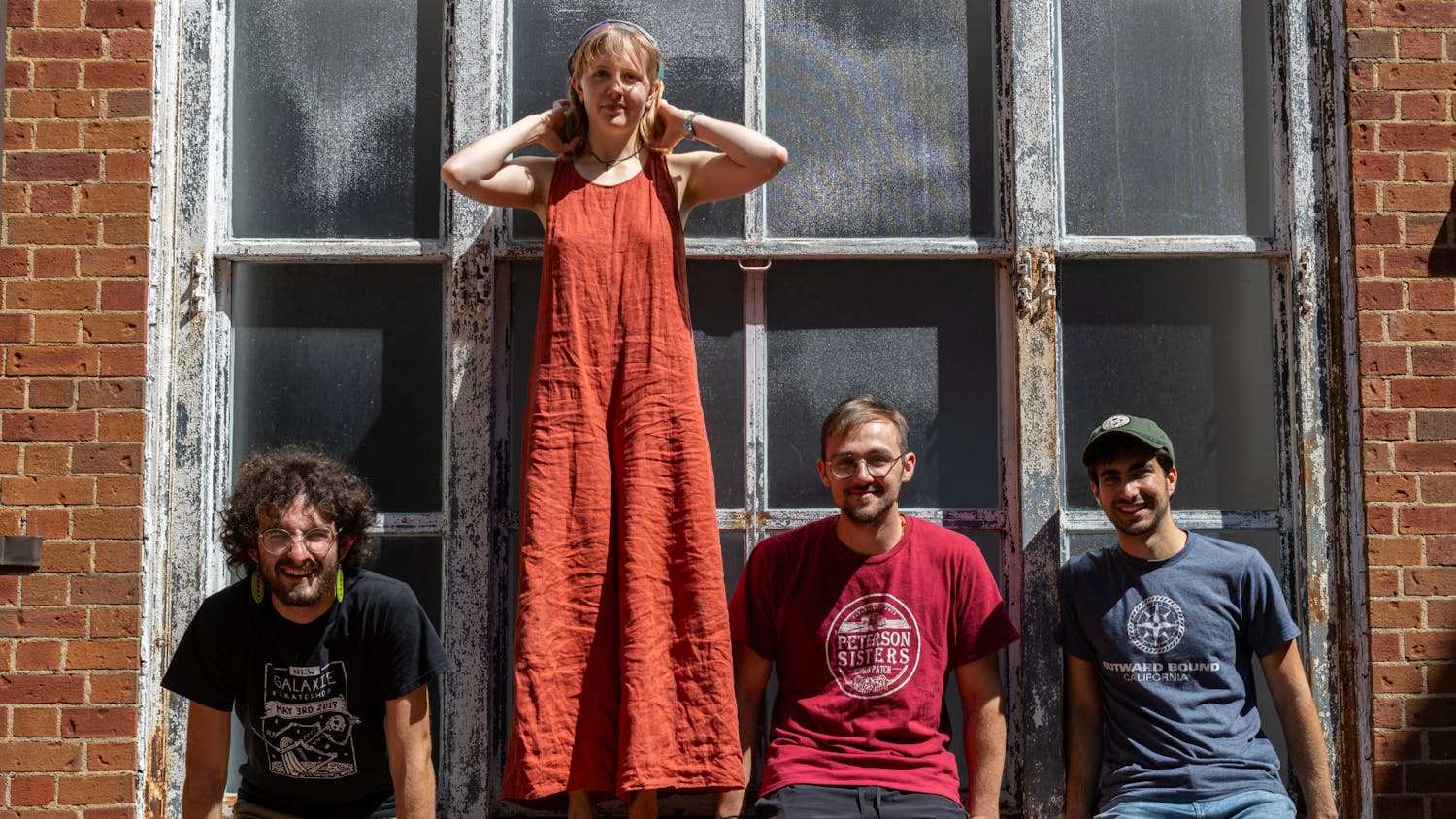Baseball has played a major role in the lives of Troy and Ty Black for as long as they can remember.
“(My brother and I) had a little plastic tee and bat, and we would hit it outside in the backyard,” Ty, a senior studying finance, said. “I got my first glove, and (my parents) introduced me to something I realized was going to help me get to college.”
Troy, who played third base for Ohio before he transferred to Murray State College in Tishomingo, Oklahoma, said he remembers growing up watching Cincinnati Reds' games every night at his grandparents' home. He started playing on a team when he was 5 or 6 years old, and he has loved the sport ever since.
“Once I got older, and I got better and better, I really started loving to compete and just really fell in love with the game,” Troy, a sophomore studying marketing and communication, said.
Ty, who plays second base, said even at age 22, he still looks forward to playing catch with his dad in the yard when he visits his hometown of Waynesville.
“I still consider it America’s pastime,” Ty said. “I know personally that growing up, there was nothing better than when my dad and I would go out to the backyard and pass (the) baseball.”
While both Troy and Ty are millennials who would like to play Major League Baseball, many young sports fanatics opt to follow more action-packed sports, such as basketball and football, instead.

Slowed Down
According to The New York Times, millennials — who the Pew Research Center defines as anyone born between the years 1981 and 1997 — are often depicted as being “impatient” and in need of instant gratification.
Millennials could be less interested in the sport as a whole as baseball is generally a slower sport with less action, Tyler Finkler, a senior studying marketing, said.
“People aren’t dunking basketballs in it or anything else like that,” Finkler, who plays shortstop for Ohio, said. “It’s more of a slower-paced game, and sometimes it can be a little boring.”
However, Finkler, who is from Olmsted Falls, said he thinks part of what makes baseball fun is how a game can last as long 8 hours.
Rob Smith, who has been OU’s head baseball coach since 2013, said he has not seen a distinct difference in interest over time from high school athletes looking to play at the collegiate level.
The type of audience at a typical college baseball game depends on the weather and the enrollment size of the school, Smith said. At OU, the audience is usually made up of parents, and students attend games when the weather is pleasant, he said.
Clay Johnson, a junior studying sport management, has not played baseball since he was in middle school, but said he still watches the Cleveland Indians almost every night the team is on television. He said other sports have more consistent action than baseball has, which he thinks contributes to the lack of millennial interest.
“I think (people) find football a more up-tempo game, and I think ... you can be a pretty die-hard football fan and only commit one day a week to it,” Smith said. “In baseball, if you’re really going to follow a major league team, it takes a little more day-to-day energy.”
Colby Hart, a senior studying sport management, said the baseball season is “too long” and the fact that MLB teams play 162 games a season is “just ridiculous.”
I would consider it an old-people sport,” Hart said. “People are like ‘it’s still America’s pastime,’ which it’s not. (America’s pastime) is football now.”

Evolution of the game
The “steroid era” of baseball, or when many players took performance-enhancing drugs to improve their game, started in the late-1980s and lasted until the late-2000s, according to ESPN.com, though it did not have a clear-cut time frame. When the MLB implemented league-wide drug testing in 2003, it marked the unofficial end of the era, according to the MLB’s website.
Ty said during that era of baseball, pitchers focused less on varying their pitches and more on speed. He thinks the higher home run rate during that time contributed to larger audiences at games.
In college baseball, there was a period of time referred to as “gorilla ball," in which teams would play in high-scoring games filled with many home runs, Ty said. Then, the National Collegiate Athletic Association changed the structure of metal bats so they would perform similarly to wooden bats used by professional players, according to its website. The change was made to correct the home run rates at the time, and created a more strategic game focused on pitching, Ty said.
However, home runs decreased because the NCAA did not initially change the baseballs to accommodate the new bats.
Eventually, the league flattened the seams on the baseball to reduce the friction of the ball when hit the new bats, Ty said, and home runs partially increased.
“I think (the NCAA is) trying to make corrections to the home run rates because I think they understand that (home runs are) one of the most exciting plays in sports,” Ty said.
After changes were made to the professional and collegiate level, the game of baseball evolved from a hitting game to a pitching game, Ty said.
Ty said he enjoys attending professional baseball games because the teams are playing against “the best of the best” at an elite level. Pitchers are throwing baseballs anywhere from 95 to 105 mph.
“To me, playing Division I baseball, I can appreciate how hard (pitching) truly is and how hard it is of a game for the hitters to score a run,” Ty said.
The MLB has tested a series of clocks for pitchers and hitters to help speed up games, according to the MLB’s website. Smith said pitching clocks could change the pace, as well as help a pitcher with his timing.
I think the faster the game can be played, the better,” Smith said.

A Social Sport
To get younger people more interested in attending professional games, Troy said he thinks the MLB should focus on attracting younger viewers with discounted tickets. He also said high school teams should be encouraged to attend professional games together to be inspired by the major league players.
If the prices of tickets and refreshments at games were cheaper, Ty said he thinks more young people would attend the games without worrying about “spending a fortune.”
According to a study published by gobankingrates.com in April, the average day at an MLB ballpark is about $78 for two people, including tickets, food and parking.
It is more affordable for young people to attend games during "student nights," when they can get into the park for less money, or when food promotions such as “dime-a-dog” nights are implemented, Johnson said.
“I think most people would rather be at the stadium than watch it on TV, but it is expensive to go,” Johnson said.
Hart said he enjoys attending football and basketball games, as well as watching them on TV, but he only really enjoys going to baseball games because it tends to be a more social event. The slow nature of the game offers plenty of room to have conversations with other attendees, he said.
Other sports, however, have more exciting traditions that take place before and during the games — such as tailgates and enthusiastic student sections — which could be a reason baseball lacks a strong social atmosphere, Ty said.
But because baseball has been such a big part of Troy and Ty’s lives, they both said they do not see themselves falling out of love with the sport anytime soon.
“There’s nothing prettier than fresh green grass,” Ty said. “And when they stretch the American flag over center field. I think that’s just awesome.”
Ty vividly remembers attending his first professional game to see the Dayton Dragons, a Class A minor league team.
The Dragons, a team that is affiliated with the Reds and has a dedicated fanbase, has the longest sellout streak in sports history, with its number surpassing 1,000 sellout games, according to milb.com.
Some of the players Ty watched at his first game ended up moving on to play in the MLB, which is something he said stuck with him because he felt like he “grew up with them.”
“I thought they were superstars when I was younger even though some of them turned into superstars as they progressed in their careers,” Ty said.






